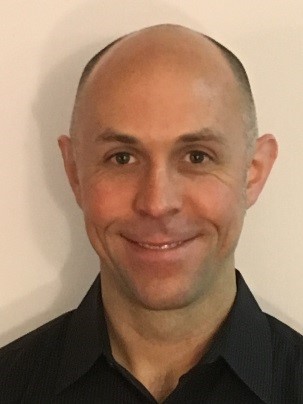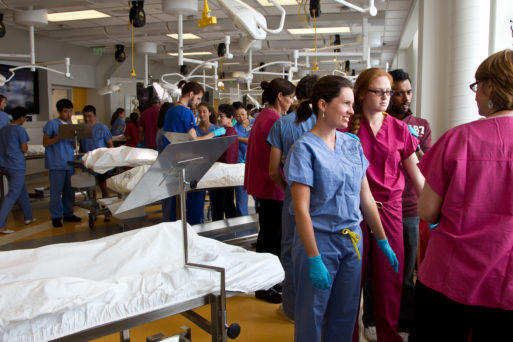This is the first of a two-part SevenPonds interview with Andrew Corson, Director of the Willed Body Program at the University of California, San Francisco. A division of the UCSF Department of Anatomy, the program provides donated human remains to the UCSF medical and dental schools and a variety of research and educational programs across Northern California. Today Andrew speaks with us about how he became involved with the Willed Body program, what it is, and why whole body donation is important to scientific and medical progress.

Andrew Corson: Director of the Willed Body Program at UCSF
Kathleen: Thanks for speaking with me today, Andrew. Can you start by telling me a little about your background and how you became involved with the Willed Body Program at UCSF?
Andrew: Sure. My background is in funeral service. I was funeral director and embalmer with a corporate funeral home for many years, and I truly enjoyed working with bereaved families and assisting them during what is undoubtedly one of the hardest times in anyone’s life. But as time went on, the emphasis in the funeral industry became more about “making the sale” than on helping people with their grief. By 2001, I decided I needed a change and took a position as an embalmer with the UCSF Department of Anatomy. I was the program’s main embalmer for six and a half years.
Kathleen: How did you make the transition from embalmer to program director?
After so many years of working in the lab, I missed working with families. So in 2007, I took over as program director, which gave me the opportunity to begin engaging with people in a personal way again. Now, I oversee the program, but I also spend a great deal of time talking with people who are considering donating their own or a loved one’s body to science. I answer their questions and often have lengthy conversations with them about why whole body donation is such an important gift. It makes my work much more personally meaningful for me.
Kathleen: That leads me to my next question, Andrew: What is the purpose of whole body donation? Why, for example, would I want to donate my entire body to science versus just donating an organ or organs?
Andrew: The donors that we receive through the Willed Body Program are used primarily for medical education and, to a lesser extent, research. Obviously, when a person donates an organ or organs after death it is a wonderful gift that saves lives in an immediate way. With that said, giving one’s whole body for the purpose of education provides the foundation for a physician’s entire medical career. Later, that physician may have a positive impact on hundreds if not thousands of lives.

Medical students gather in the anatomy lab at UCSF
(Credit: Susan Merrell )
In the anatomy lab at UCSF, medical students gain irreplaceable knowledge, both about the human body and about themselves. Working with the same cadaver day after day, they develop a personal relationship with the donor: Many doctors have said to me that they view the cadaver they worked on in the lab as their very first patient. Computer models have a place in learning, but nothing can take the place of that hands on experience. It teaches students about the complexity and fragility of the human body and gives them important insight into their own mortality.
Kathleen: Are the bodies always kept at UCSF or are they, or perhaps an organ, occasionally sent elsewhere?
Andrew: At times, UCSF may loan a body or organ to another educational institution or for-profit facility. For example, the program supplies cadavers to undergraduate anatomy programs at Cal State University and some community colleges and private universities throughout Northern California. Under certain circumstances, we might also loan a body or specific organ to a for-profit facility involved in research or testing of new medical therapies, surgical techniques or medical equipment. However, we always vet these requests very carefully and the cadaver is always returned to us when the research is complete.
Kathleen: What happens to the remains after they are no longer being used for study or research? Is the family notified when that occurs?
Andrew: After all study is complete, the remains are cremated and the ashes are scattered at sea. Unfortunately, UCSF cannot be responsible for notifying the family when this occurs.
Please visit SevenPonds again next week for part two of Andrew’s interview

 What Is Whole Body Donation? An Interview with Andrew Corson, Part One
What Is Whole Body Donation? An Interview with Andrew Corson, Part One


 “In Case You Don’t Live Forever” by Ben Platt
“In Case You Don’t Live Forever” by Ben Platt
 Our Monthly Tip: Make an “In Case of Death” File to Ease Loved One’s Grief
Our Monthly Tip: Make an “In Case of Death” File to Ease Loved One’s Grief
 Passing of Beloved Comedian Births a New Comedy Festival
Passing of Beloved Comedian Births a New Comedy Festival















I am interested in this program for myself..Please send a form for me to fill out..thank you and Blessings
Report this comment
Hi Pat,
I can’t supply the form for you but I can give you the contact information for the Willed Body Program at UCSF. They can answer any questions you have and send you a form to register.
Here it is….
Willed Body Program
University of California, San Francisco
Department of Anatomy, AC-14
San Francisco, CA 94143-0902
Phone: (415) 476-1981
Fax: (415) 502-1460
willedbodyprogram@ucsf.edu
If you would like to download a form and simply return it to them you can find a link at the bottom of this page. http://willedbodyprogram.ucsf.edu/
Hope that’s helpful!
Report this comment